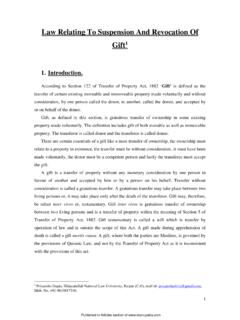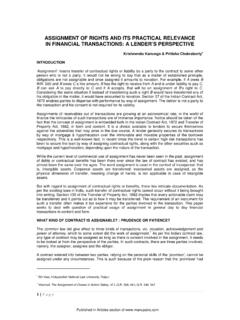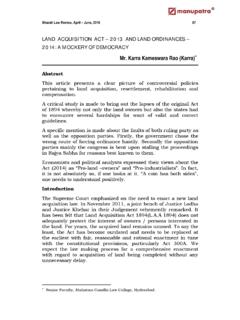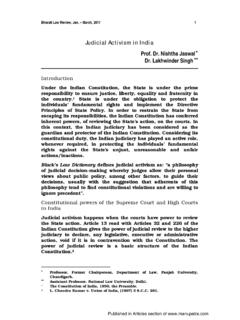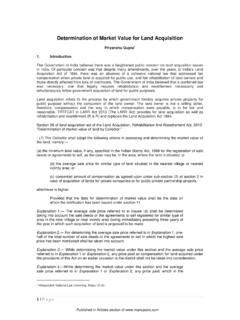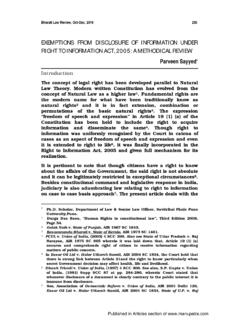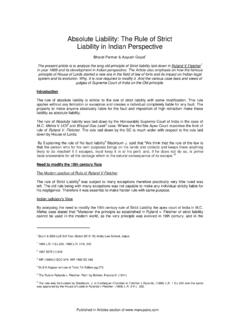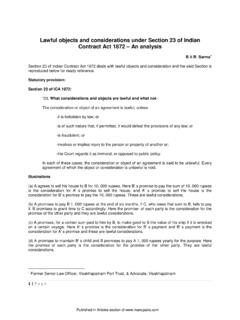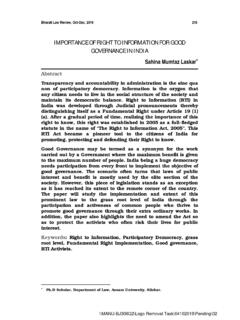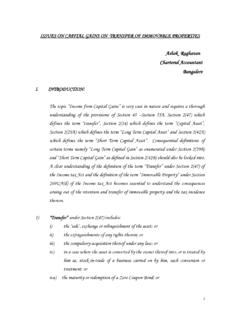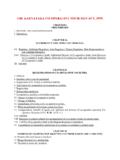Transcription of Rights of a Lessee to retain possession of premises ...
1 RIGHT OF A Lessee TO retain possession OFPREMISES subsequent TO determination OF LEASEBY EFFLUX OF TIMEM itali Yadav and Sahil Asthana The Transfer of Property Act, 1882 (hereinafter referred to as the Act ) is the legislation whichgoverns transfer of immovable property 1in the case of Shree Arcee Steel Private Limited & Anr v. Bharat Overseas Bank Limited2, the courtheld that: The meaning of the word "immovable" means permanent, fixed, not liable to be removed. In otherwords, for a chattel to become immovable property, it must be attached to the immovable propertypermanently as a building or as a tree attached to earth.
2 Though a moveable property is attached toearth permanently for the beneficial use and enjoyment, is still a movable property. For an illustration,though a sugar cane machine/or an oil engine is attached to earth, it is moveable property. Section 5 of the Act defines what constitutes a transfer of property . The said section is extractedhereinbelow Transfer of property defined In the following section transfer of property means an act by whicha living person conveys property, in present or in future, to one or more other living persons, or tohimself, [or to himself] and one or more other living persons; and to transfer property is to performsuch act.
3 [In this section living person includes a company or association or body of individuals, whetherincorporated or not, byt nothing herein contained shall affect any law for the time being in forcerelating to transfer of property to or by companies, associations or bodies of individuals.] Further, Section 63of the Act details what all may be transferred by and under provisions of the said section provides that, property of any kind may be transferred except as otherwise providedby this Act or by any other law for the time being in force.
4 Furthermore, a transfer of an immovable property may be made by various means/ instruments,including but not limited to sale, mortgage, lease, gift, relinquishment, release etc. However, for thepurpose of this article, we shall be focusing on the concept of lease. Alba Law Offices, Flat No. 3D, Girdhar Apartment, 28, Firozshah Road, New Delhi - 110001 Published in Articles section of OF A LEASE of Lease: Lease of an immovable property is defined and detailed under Chapter V of the Transfer of PropertyAct, 1882 (hereinafter referred to as the Act ).
5 Section 105 of the Act defines the term lease , lessor , Lessee , premium and rent . The said section has been extracted below, for ease of 105 of the Act - a lease of immovable property is a transfer of a right to enjoy such property,made for a certain time, express or implied, or in perpetuity, in consideration of a price paid orpromised, or of money, a share of crops, service or any other thing of value, to be renderedperiodically or on specified occasions to the transferor by the transferee, who accepts the transfer onsuch , Lessee .
6 Premium and rent defined: The transferor is called the lessor, the transferee is calledthe Lessee , the price is called the premium, and the money, share, service or other thing to be sorendered is called the rent. Ingrediants of a Lease:On review of Section 105 of the Act (extracted hereinabove), the essential ingrediants to constitue a valid lease of an immovable propertyappear to be the following4 (a)Transfer of right in the property An interest in the subject property is to be created in favourof the Lessee by the lessor.
7 (b)Duration of a lease Interest created in the property could be for a specified period (eitherexpressedor implied) or even in perpetuity. Parties to the lease are at liberty to decide the duration ofthe said lease.(c)Consideration A valid consideration needs to be paid, periodically or on specifiedoccassions by the Lessee to the of a Lease:Further, Section 107 of the Act provides that a lease of an immovable property for a term exceeding ayear can only be made by a registered instrument5.
8 In the event, the same is not made through aregistered instrument, then, contrary to what is mentioned in the said lease, the duration of the leasewill be assumed to be of a month, and the same may be terminated by either party by providing afifteen days notice6. However, in case the term is less that a year, then the said lease may be madeeither by oral agreement accompanied by delivery of possession of the immovable property, or by aregistered said Section 107 of the Act is extracted hereinbelow A lease of immovable property from year to year, or for any term exceeding one year or reserving ayearly rent.
9 Can be made only by a registered other leases of immovable property may be made either by a registered instrument or by oralagreement accompanied by delivery of in Articles section of a lease of immovable property is made by a registrerd instrument, such instrument or, wherethere are more instruments than one, each such instrument shall be executed by both the lessor andthe that the State Government may from time to time, by notification in the Official Gazette,direct that leases of immovable property, other than leases from year to year, or for any termexceeding one year, or reserving a yearly rent, or any class of such leases, may be made byunregistered instrument or by oral agreement without delivery of possesssion.
10 Of a Lease:Section 111 of the Act details the events/ means by which a lease may be determined. The saidsection is extracted hereinbelow - A lease of immovable property determines-(a)by efflux of the time limited thereby,(b)where such time is limited conditionally on the happening of some event-by the happening ofsuch event,(c)where the interest of the lessor in the property terminates on, or his power to dispose of thesame extends only to, the happening of any event-by the happening of such event,(d)
